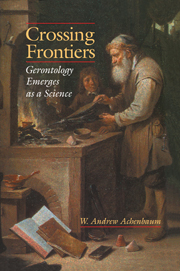Book contents
- Frontmatter
- Contents
- Acknowledgments
- Abbreviations
- Introduction
- Part I Old age becomes a “problem” worth investigating scientifically
- Part II Gerontology takes shape in the era of Big Science
- 4 Organizing the Gerontological Society to promote interdisciplinary research amid disciplinary and professional constrictions
- 5 Risk taking in the modern research university and the fate of multidisciplinary institutes on aging
- 6 The federal government as sponsor, producer, and consumer of research on aging
- 7 Gerontology in the service of America's aging veterans
- Conclusion
- Index
5 - Risk taking in the modern research university and the fate of multidisciplinary institutes on aging
Published online by Cambridge University Press: 26 March 2010
- Frontmatter
- Contents
- Acknowledgments
- Abbreviations
- Introduction
- Part I Old age becomes a “problem” worth investigating scientifically
- Part II Gerontology takes shape in the era of Big Science
- 4 Organizing the Gerontological Society to promote interdisciplinary research amid disciplinary and professional constrictions
- 5 Risk taking in the modern research university and the fate of multidisciplinary institutes on aging
- 6 The federal government as sponsor, producer, and consumer of research on aging
- 7 Gerontology in the service of America's aging veterans
- Conclusion
- Index
Summary
The Gerontological Society (GSA), the previous chapter showed, has had difficulty defining its multidisciplinary aims and developing modi operandi in ways not unduly constrained by the competing professional loyalties of its members. This chapter, which reconstructs the history of the University of Michigan's (U-M) Institute of Gerontology (IoG), illustrates how parochial academic interests can exercise a different set of pressures on centers based in universities. However, the increasing role that state and federal agencies have assumed in addressing the needs of older persons in the United States has created unprecedented opportunities for such centers to produce, disseminate, and apply gerontologic knowledge. These opportunities, in turn, have begun to call into question the purposes and organization of research in higher education.
For roughly a century, departments have represented the range of disciplinary interests on campus and have borne primary responsibility for undergraduate education. Free-standing multidisciplinary units, in contrast, are supposed to embody “diversity of scholarship … novelty and venture-someness, [and] imagination and creativity [that rely more upon] synthetic work and the development of new conceptual paradigms and unifying theories than upon specialization and fragmentation of knowledge.” Such grand claims notwithstanding, centers on aging actually are expected to survive on their wits. They rise or fall at the margins of the local academic community on their ability to obtain outside funds and extramural recognition. Intended to manage intellectual risks differently than departments, multidisciplinary centers have come to play important if still anomalous roles at research universities like Michigan.
- Type
- Chapter
- Information
- Crossing FrontiersGerontology Emerges as a Science, pp. 157 - 186Publisher: Cambridge University PressPrint publication year: 1995



